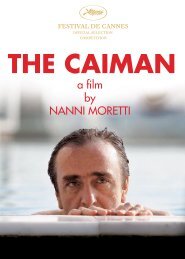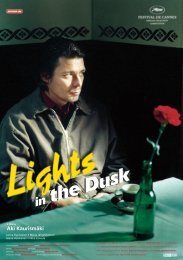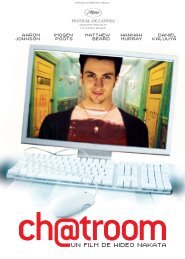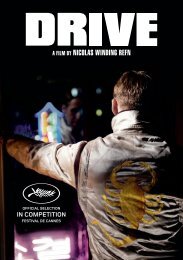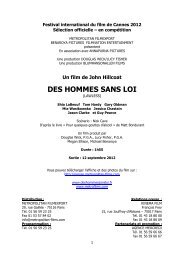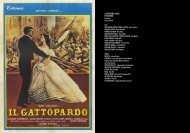The Conquest - Festival de Cannes
The Conquest - Festival de Cannes
The Conquest - Festival de Cannes
You also want an ePaper? Increase the reach of your titles
YUMPU automatically turns print PDFs into web optimized ePapers that Google loves.
THE CONQUEST<br />
DISTRIBUTOR / GAUMONT<br />
Quentin BECKER / Carole DOURLENT<br />
30, avenue Charles <strong>de</strong> Gaulle 92200 Neuilly/Seine<br />
Tél : +33 1.46.43.23.06 / 23.14<br />
qbecker@gaumont.fr / cdourlent@gaumont.fr<br />
GAUMONT and MANDARIN CINEMA<br />
present<br />
A film by<br />
Xavier DURRINGER<br />
Script and dialogues by<br />
Patrick ROTMAN<br />
With<br />
Denis PODALYDES Florence PERNEL Bernard LE COQ<br />
Hippolyte GIRARDOT Samuel LABARTHE<br />
RELEASE : MAY 18th 2011<br />
Length : 1h45<br />
Official site : www.gaumont.fr<br />
Press site : www.gaumontpresse.fr<br />
INTERNATIONAL PRESS / GAUMONT<br />
Ariane TOSCAN DU PLANTIER<br />
30, avenue Charles <strong>de</strong> Gaulle 92200 Neuilly / Seine<br />
Tel : +33 1.46.43.20.25<br />
atoscan@gaumont.com
May 6, 2007. France’s run-up to<br />
the presi<strong>de</strong>ntial elections.<br />
As the French people are getting<br />
ready to go to the polls to<br />
elect their new presi<strong>de</strong>nt, Nicolas<br />
Sarkozy has shut himself away in<br />
his home. Even though he knows<br />
he has won the battle, he is gloomy<br />
and looks <strong>de</strong>spon<strong>de</strong>nt in his<br />
dressing gown. All day long, he<br />
has been trying to get in touch<br />
with Cécilia – to no avail.<br />
<strong>The</strong> last five years unfurl before<br />
our eyes, recounting Sarkozy’s<br />
unstoppable ascent, riddled with<br />
backstage un<strong>de</strong>rhand trickery,<br />
fits of anger and confrontations.<br />
THE CONQUEST is the story of<br />
a man gaining power and losing<br />
his wife.<br />
2 3
A First<br />
When Eric et Nicolas Altmayer came to me with a project written by Patrick Rotman that focused on Nicolas<br />
Sarkozy’s conquest of power, I was a little worried because until then no film had ever been ma<strong>de</strong> about a<br />
presi<strong>de</strong>nt in office, not even in the United States. It was an uphill struggle, let alone the fact that I am pretty<br />
anxious and rather paranoid to begin with. <strong>The</strong>refore, I thought that the best option was to have an honest<br />
approach and again raise the question of France’s political life. For example, we did not change the names<br />
of the protagonists, which involved legal issues. And the more I was told not to <strong>de</strong>al with this matter, the more<br />
excited I felt. It was necessary to make this film and to conquer uncharted territory.<br />
When Eric et Nicolas Altmayer brothers came to me with a project written by Patrick Rotman that focused on<br />
Nicolas Sarkozy’s conquest of power, I was a little worried because until then no film had ever been ma<strong>de</strong><br />
about a presi<strong>de</strong>nt in office, not even in the United States. It was an uphill struggle, let alone the fact that I am<br />
pretty anxious and rather paranoid to begin with. <strong>The</strong>refore, I thought that the best option was to have an honest<br />
approach and again raise the question of France’s political life. For example, we did not change the names<br />
of the protagonists, which involved legal issues. And the more I was told not to <strong>de</strong>al with this matter, the more<br />
excited I felt. It was necessary to make this film and to conquer uncharted territory.<br />
A shAkespeAreAn script<br />
What I found thrilling was the fact that it was about a fight insi<strong>de</strong> the same camp - Chirac, Villepin and Sarkozy<br />
were fighting for power. It read like a Shakespearean script. And what appealed to me was the extraordinary<br />
metaphor of love embodied by Cécilia Sarkozy, who for twenty years had struggled to pull the man she loved<br />
from the shadow into the light and who walked out on him for another man on the day he conquered power.<br />
Pure fiction! <strong>The</strong> essence of drama!<br />
It was crucial to make a film which would neither blame nor praise the protagonists but portray them as sensitive,<br />
human and sometimes complex and emotionally unbalanced creatures. Thus it is a film about politics but about<br />
the emotional and psychological stakes involving the conquest of power. Actually I hope that the audience who<br />
sees the film will leave the theatre wanting to go on discussing the theatrical dimension of the political arena. We<br />
ma<strong>de</strong> this film to spark a <strong>de</strong>bate, to have viewers won<strong>de</strong>r why Sarkozy has moved them so much and how he<br />
managed to win over 80% of the far-right voters.<br />
We wished to <strong>de</strong>scribe the infernal mechanism of the conquest: this film aims to be an eye opener.<br />
« All the world’s A stAge »<br />
make-up artists their make-up, and tailors their clothes. <strong>The</strong>y have speechwriters whose lines they rehearse before<br />
reciting them in front of an audience. When they are in the spotlight they are confronted with audiences who<br />
cheer them on. Like actors, they experience loneliness before the curtain rises. In fact they are constantly in the<br />
spotlight and un<strong>de</strong>r the scrutiny of journalists who criticise them, whether they are on their si<strong>de</strong> or their opponents’.<br />
It remin<strong>de</strong>d me of a theatrical metaphor. In my view this film is a representation of reality. Just like theatre<br />
actors, politicians are cut off from the world reality. It was consequently important to show Sarkozy rehearsing<br />
4 5
in front of empty theatres before appearing in front of his audience. When he flaunted his sadness or his dismay<br />
before journalists, it was nothing less than a stage performance aimed at showing the French people that he was<br />
just an ordinary man. All of this is un<strong>de</strong>r strict control to strike a chord with voters.<br />
Nicolas Sarkozy is the politician who dramatically changed the relationship between politicians and the media<br />
and the image conveyed by politicians as stars. He chose to play the card of transparency. For the first time in<br />
the history of French political life, a presi<strong>de</strong>nt wearing sunglasses appeared in glossy magazines that featured<br />
his holidays and his love affair with a mo<strong>de</strong>l! He is the first presi<strong>de</strong>nt to have revealed his innermost feelings.<br />
That’s why it was possible for us to make a movie.<br />
As he says in the film “in the name of that bloody transparency, now I am held accountable!”<br />
<strong>The</strong>re were also scenes that everybody has seen a million times, like the one in La Baule in which Villepin<br />
emerges from the sea. My choice was to shoot all the scenes from the other si<strong>de</strong> of the looking glass. I mean<br />
instead of shooting journalists, trying to approach politicians, with their back to the camera, we shot them facing<br />
it. Peeking at private moments, how exciting!<br />
From Film noir to western<br />
What struck me was that the world of politicians inclu<strong>de</strong>s the<br />
same co<strong>de</strong>s as those you find in film noir movies. You also find<br />
hierarchy, with armed bodyguards equipped with earpieces,<br />
wearing dark glasses, and the boss at the top of the pyramid. It<br />
is a little like THE GODFATHER which was a metaphor of the film<br />
director. Politicians attack each other with vitriolic sound bites and<br />
make phone calls cupping their hand over their mouth to prevent<br />
lip-reading. It is a world in which the cult of secrecy prevails and<br />
in which subordinates and un<strong>de</strong>rlings are willing to give their life<br />
to protect the boss, in accordance with their co<strong>de</strong> of honour.<br />
And there is pungent dialogue – especially with Chirac and Villepin<br />
who don’t mince their words. That’s why I used close-ups of the protagonists,<br />
as in westerns, the difference being that in my movie it is the words that kill. I must<br />
say that being used to filming groups of men, I felt quite comfortable in this political<br />
world where Sarkozy is always surroun<strong>de</strong>d by his advisers.<br />
In the history-la<strong>de</strong>n halls <strong>de</strong>corated with gil<strong>de</strong>d panelling, the dialogue – reminiscent<br />
of films written by Audiard – goes back and forth between the protagonists in sometimes<br />
highly dramatic situations and adds a humorous dimension to the film.<br />
plAying reAl-liFe Figures<br />
When Denis Podalydès arrived for the screen tests, his bald skull covered with shoe<br />
cream, he sud<strong>de</strong>nly fit into the character, spoke and moved like Sarkozy without<br />
mimicry or false posture. He had the right voice; therefore I knew he would have<br />
the right body. We didn’t use any artificial <strong>de</strong>vices except for make-up, as for any<br />
other actor. Denis told me right away: «I’ll be straightforward” And he played the<br />
character with his qualities and weaknesses, so much so that we believe him when he says what he says. And<br />
this symbolises quite well the sort of man Sarkozy is. For instance he is very serious when he <strong>de</strong>clares that he will<br />
make a retreat in a monastery, and ends up on multibillionaire Bolloré’s yacht. But we do believe him.<br />
Denis is highly talented, both serious and pungent, a real comedian. You could almost look at Sarkozy and<br />
figure that he is a caricature of Podalydès, the actor.<br />
Denis being the fantastic actor that he is, the rest of the cast had to be as stunning so as not to be outshined by<br />
him. Bernard Le Coq as Chirac, Samuel Labarthe as Villepin and Florence Pernel as Cécilia, all match up to<br />
Denis and they were in symbiosis with him. All of them did a great job altering their voices and their bodies, a<br />
rather risky business.<br />
I also wanted the supporting cast, Hippolyte Girardot, Saïda Jawad, Mathias Mlekuz, Grégory Fitoussi and<br />
Dominique Besnehard, to have specific relationships with Nicolas Sarkozy, to serve him and address him in a<br />
special way… We all worked hard together, constantly doing research, communicating<br />
and discussing.<br />
Likewise, I had to work with the extras, to make their cheering and touching<br />
Sarkozy believable. And it was the very passion of the crowd that galvanised<br />
Denis.<br />
clAssicism At its best<br />
We nee<strong>de</strong>d a classical mise-en-scene. I alternated between tracking shots and<br />
long sequence shots following Denis Podalydès who was able to act for about<br />
four minutes non-stop. We allowed the actors to be free and position themselves<br />
on the set. Even if you believe you are at the Elysée or at Beauvau, we didn’t<br />
actually shoot the sets; what we shot were faces and bodies. That’s why there<br />
are so many long shots, to give pre-eminence to the actors’ bodies and to give<br />
priority to the pacing and the movement so that no two scenes were alike.<br />
By examining the pictures, I realised that the advisors were<br />
always standing there, on the look-out, on the alert. Thus while<br />
Villepin and Sarkozy are sitting behind their <strong>de</strong>sks, their men<br />
are constantly in motion.<br />
<strong>The</strong> film was shot in Super 35mm Cinemascope, with only one<br />
camera.<br />
loneliness<br />
I wanted the opening scene of the film to be symbolical and<br />
metaphorical. A very slow tracking shot reveals a <strong>de</strong>eply lonely<br />
man, wearing a dressing gown, toying with his wife’s<br />
wedding ring on the very day he becomes France’s Presi<strong>de</strong>nt.<br />
This shot sums up the whole film: «he is the only one knowing what he’s won compared<br />
to what he’s lost and he is the only one knowing what he’s lost compared<br />
to what he’s won”<br />
<strong>The</strong>re are other shots revealing the loneliness of this man who, paradoxically<br />
enough, is always surroun<strong>de</strong>d by people, in his office, in front of a cheering<br />
crowd, at a si<strong>de</strong>walk café etc. He is <strong>de</strong>finitely a Shakespearean character.<br />
music As counterpoint<br />
My first and only choice for the composer was Nicola Piovani. I had in mind his<br />
pieces for Fellini’s last two movies INTERVISTA and LA VOCE DELLA LUNA, and<br />
his film scores for the Taviani brothers or for Roberto Benigni’s LIFE IS BEAUTIFUL.<br />
I wanted the music to create a feeling of distance from the action; I wanted a baroque<br />
counterpoint that would call to mind the circus or the opera and conjure up<br />
the dramatic quality of political life as well as its burlesque aspect. I do think that<br />
Sarkozy with his twitches and almost jumpy gait looks a bit like Charlie Chaplin.<br />
« I’ll be everywhere at once. Keep them guessing.<br />
Launch 8 projects. <strong>The</strong>y’ll be punch-drunk.<br />
I’ll be Headline Minister ! »<br />
Nicolas SARKOZY<br />
6 7
genesis oF An extrAordinAry project<br />
It was not a new project : Eric and Nicolas Altmayer had contacted me after seeing my film on Chirac, which had<br />
been broadcast in 2006 on France 2 television channel. <strong>The</strong>y wished to talk to me about shooting a political thriller.<br />
It was to focus on the four weeks following the <strong>de</strong>ath of the French presi<strong>de</strong>nt. To be honest, I was not thrilled<br />
by the project, I thought that if we ma<strong>de</strong> a political movie, we should stick as close as possible to real facts, the<br />
way the Anglo-Saxons do, because viewers need a reference framework to relate to the story. Actually I have<br />
thought for years that it would be a good i<strong>de</strong>a to make a fictional film based on real political figures. <strong>The</strong> i<strong>de</strong>a<br />
came to me as I was shooting the documentaries on Mitterrand and Chirac. I believe that these two presi<strong>de</strong>nts<br />
make for good fictional characters in a feature film. In the political world tensions are extreme, passions violent<br />
and hatreds intensified.<br />
With Sarkozy you get all the elements you can dream of to recount the conquest of power in the media age, as<br />
well as the kind of melodramatic dimension that no screenwriter would ever dare invent… Thus I proposed to the<br />
Altmayer brothers to write this story for the screen the way the Anglo-Saxon screenwriters do. <strong>The</strong>y quickly gave<br />
me the green light to write the script, the first one ever written about a French presi<strong>de</strong>nt in office, with the real<br />
characters’ names. We were very eager to work on uncharted territory and did our best to live up to the stakes.<br />
It did not take us long to <strong>de</strong>ci<strong>de</strong> that the story had to take place within a single day, the day of the run-up to the<br />
presi<strong>de</strong>ntial election, which must be seen within the context of the five years that had led to Sarkozy’s conquest<br />
of power.<br />
documentAry immersion<br />
To make my film on Chirac I had collected a large number of documents and interviewed dozens of people,<br />
Sarkozy being one of them.<br />
For THE CONQUEST, I studied everything that had been printed in the press between 2002 and 2007 and read<br />
some sixty books which I had carefully annotated. This allowed me to authenticate the reliability of some stories<br />
and anecdotes which are inserted in my script. After that I met with informants, protagonists and witnesses.<br />
I also watched hours of stock footage and this helped me to visualize some scenes.<br />
I was also helped by Michaël Darmon, a France 2 journalist who had been hired as a “history consultant” by the<br />
producers because he had witnessed a lot of events mentioned in the movie and had covered Sarkozy for years.<br />
His notebooks, which cover several years, provi<strong>de</strong>d us with highly valuable information such as who is on friendly<br />
terms with whom, in whose office do they meet, what do they say about such and such a political lea<strong>de</strong>r? Etc.<br />
greAter thAn liFe<br />
I insist, THE CONQUEST is a fiction film, it is well documented but it is a fiction nonetheless, with essentially imagined<br />
scenes and invented dialogue. <strong>The</strong>re are some twenty scenes which are close to reality, like the one-on-one<br />
encounters between Sarkozy and Chirac and the clashes between Sarkozy and Villepin. On the other hand lots<br />
of sequences are totally imaginary as when Villepin has Chirac repeat «I <strong>de</strong>ci<strong>de</strong> and he executes» .<strong>The</strong> scene<br />
is imaginary but there is some truth in it. I know that Villepin actually had Chirac rehearse his speeches before<br />
some of his television appearances, and I am pretty sure (I learnt it from a reliable source) that Villepin is the one<br />
who came up with that choice of words. Just as he did say «I’m going to fuck him up». You have to realise that<br />
this is the way politicians most often talk. That’s why I was very careful to use this extremely violent style, which<br />
may surprise many viewers. In this movie everything is mixed up, truth and untruth, real elements with imaginary<br />
ones. At the end of the day, fiction is a way of telling the truth with a pinch of untruth thrown in. What matters is<br />
not so much accuracy but credibility.<br />
humAn, terribly humAn<br />
From the very start I did not intend to write a satire or a political tract, viewers will not change their political<br />
views after seeing the film! It is first and foremost a cinematic work. And by the way, the movie makes Sarkozy<br />
look more human, more like a very lonely guy, with his wounds and weaknesses. This is a man who puts his<br />
obsessive lust for power before anything else and who consequently loses his wife. It is all the more important<br />
as Sarkozy himself can be grotesque at times and if I had exaggerated he would have come across as a ridiculous<br />
puppet. He is a bit like a gang boss with very loyal advisors. He needs to be supported, cheered up,<br />
entertained etc. That’s why I found it interesting to remain insi<strong>de</strong> the clan of the “Sarko’boys” and watch their<br />
rivalries and internecine wars.<br />
Sometimes, Sarkozy is so touching that you want to comfort him, then he becomes obnoxious and awe-inspiring<br />
or else he is a brilliant manipulator with plenty of intuitive skills etc. I used the same approach as in my<br />
documentaries: I never tried to arouse empathy or hatred. I merely wished to show that politicians are “exceptional<br />
creatures” with complexities and contradictions. That’s why they are cinematic characters.<br />
« I’m alone. I forged myself and I’ll fight to the end.<br />
I know Chirac better than he knows me.<br />
He won’t catch me. He’s history.<br />
I’m free. I’m alone and I’m free.<br />
And you, Dominique... you’re a <strong>de</strong>ad man. »<br />
Nicolas SARKOZY<br />
8 9
A worn-out politicAl system<br />
We had the project in mind long before the 2007 French presi<strong>de</strong>ntial election. We inten<strong>de</strong>d to produce a movie<br />
about politics, not only because the background and the characters are highly cinematic, even Shakespearean<br />
as regards the three main protagonists, but also because it was a great opportunity to make a movie about the<br />
world we are living in. It is a world in which as Tocqueville put it: “politics is no longer an i<strong>de</strong>ological <strong>de</strong>bate but<br />
a free-for-all in which players <strong>de</strong>mand bread, games and scapegoats.”<br />
Given the lightning speed of mo<strong>de</strong>rn media, the virulent electoral campaigns and the role played by personal<br />
rather than i<strong>de</strong>ological rivalries, the political <strong>de</strong>bate, in the noble sense of the word, has vanished. That is what<br />
we inten<strong>de</strong>d to put forward and Nicolas Sarkozy’s access to power epitomizes it all. What’s more, I think that<br />
there is a link between the current political vacuum and the way voters are turning away from the political system.<br />
Our aim was to make people aware of the dangers of this slippery slope.<br />
Our first approach to the subject was to imagine a tragic scenario: the acci<strong>de</strong>ntal <strong>de</strong>ath of the newly elected pre-<br />
si<strong>de</strong>nt, Nicolas Sarkozy, as he is <strong>de</strong>sperately driving to the Charles <strong>de</strong> Gaulle airport to get his wife back. What<br />
happens during the 45 days following his <strong>de</strong>ath? What mechanism is set in motion when new elections must<br />
be organised? To what extent is the electoral machine cut off from the i<strong>de</strong>ological <strong>de</strong>bate? But Patrick Rotman,<br />
who had first based the story on this premise, told us that it would not work. He was right, if we had put fictional<br />
characters together with real ones, we would have en<strong>de</strong>d up with characters nobody would have believed in!<br />
<strong>The</strong>refore, rather than <strong>de</strong>pict a fictional campaign, Patrick told us we’d better <strong>de</strong>scribe what really happened. He<br />
then approached Michaël Darmon, the France 2 political correspon<strong>de</strong>nt who had been covering the candidate<br />
Sarkozy for five years. Michaël was our”history advisor” throughout the script writing phase and the shoot.<br />
unchArted territory<br />
It felt as if we were entering territory that aroused everybody’s suspicions. This feeling springs from the habit of<br />
self-censorship instilled in the French system: we make it a rule not to go beyond certain fixed limits, when on the<br />
face of it, there’s no reason why we shouldn’t. So much so that lots of my friends asked me how we had managed<br />
to <strong>de</strong>al with such a sensitive subject. I answered: why shouldn’t we? As long as a movie was not inten<strong>de</strong>d to<br />
be a political tract or an indictment, but rather an Anglo-Saxon type of movie, based on real facts and realistic,<br />
there was no reason why we shouldn’t be shooting it. And by the way we found partners willing to help us put<br />
the film together. Inci<strong>de</strong>ntally Gaumont’s moral endorsement of the project encouraged our financial partners to<br />
make the film come true. We’d like to express our special thanks to them.<br />
Paradoxically enough, the Elysée did not put any pressure on us. True, at the beginning we were quite inconspicuous<br />
but little by little the script started circulating… At a very early stage Le Canard Enchaîné, a weekly<br />
satirical newspaper, had mentioned an impending project about Sarkozy. But the Elysée must have thought that<br />
10 11
direct political interference that jeopardised freedom of speech would have huge consequences. I also believe<br />
that Sarkozy is the first presi<strong>de</strong>nt whose relationship with the media is totally unconventional. He is part of a<br />
generation used to the media going over every aspect of the life of a presi<strong>de</strong>nt… Anyway, this project could<br />
be much more easily envisaged with Sarkozy than with his pre<strong>de</strong>cessors…<br />
A tight budget<br />
<strong>The</strong> film cost 5 million euros to shoot, which shows that a movie with ambitious goals like THE CONQUEST<br />
can be ma<strong>de</strong> on a budget within reasonable limits if all conditions are met. <strong>The</strong> entire cast knew that we were<br />
shooting an extraordinary film, and none of them had special <strong>de</strong>mands. Together with Xavier Durringer, we<br />
had set up an accurate work schedule involving a lot of sequence shots. We were able to do this because the<br />
cast was outstanding, especially Denis Podalydès. <strong>The</strong> actors had no difficulty with long dialogue scenes. We<br />
did not have to shoot scenes too many times and pre-production planning was very accurate.<br />
A reAl <strong>de</strong>light<br />
I didn’t expect the film to be so funny and enjoyable. I think it owes it to Xavier’s vivacious personality and to<br />
his intuitive skills, which led him to think of the commedia <strong>de</strong>ll’arte and consequently to hire Nicola Piovani<br />
for the score. It is also thanks to Denis Podalydès who knows how to create farcical situations onstage and to<br />
bring out the comic skills of the cast. In conclusion the contrast between the farcical situations and the realistic<br />
aspect of the film is quite enjoyable.<br />
« Seen the dwarf at the factory ?<br />
What a <strong>de</strong>magogue ! What populism !<br />
Like Pouja<strong>de</strong> in the 60s ! »<br />
Dominique <strong>de</strong> VILLePIN<br />
12 13
How did you first respond to the offer of playing Nicolas Sarkozy ?<br />
I was thrilled. Why? Because I love political movies. I had been wanting to play an actual or fictional politician<br />
for years. Politics offers amazing opportunities for actors and a wi<strong>de</strong> range of situations, which have hardly<br />
been tapped by French cinema. Foreign movies have paved the way with films like THE QUEEN, IL DIVO, or<br />
W. Playing Sarkozy, the current presi<strong>de</strong>nt, did not bother me, nor did it curb my enthusiasm. Quite the opposite<br />
actually. I was eager to play in the present-day world, to have an intimate relationship with Nicolas Sarkozy who<br />
is amazing whether you agree with the man’s political i<strong>de</strong>as or not.<br />
Did you need to do a lot of research? Like view stock footage in or<strong>de</strong>r to study the “character”,<br />
for instance ?<br />
Yes, I did what you usually do when you play this sort of character – I listened to his voice, watched all available<br />
documentaries, studied reports and pictures, there are countless numbers of resources. <strong>The</strong>n little by little<br />
I let the character take over, almost surreptitiously. Eventually he got into me, unobtrusively. I didn’t seek to be<br />
a carbon copy of Sarkozy, I didn’t try to look exactly like him, talk like him or walk like him. I sought to create<br />
a likeness, a character that was totally me and totally – or almost totally – Sarkozy. I once read a beautiful<br />
response that Depardieu ma<strong>de</strong> when asked the same question, “Don’t do anything, just let go”. True, he was<br />
not talking of a character study, but I think that even when you want to play somebody like Sarkozy, you must<br />
“let go” so as to convey the feeling that the actor and the character are free.<br />
Are you interested in politics ?<br />
Yes, very much so. Reading the “political” section in the newspapers is like reading a serialized novel written<br />
day after day. <strong>The</strong>re are exciting times, and frightening ones, like nowadays<br />
Did you empathize with Nicolas Sarkozy ?<br />
You must avoid taking si<strong>de</strong>s and passing judgment, you must hush the inner voice that whispers in your ear that<br />
this is not how you vote. Enhance his physical aspect, his political gift; show his daring, brisk, energetic, mysterious<br />
personality. And his sense of humour. He has a much greater sense of humour than most politicians.<br />
How did you work on the voice ?<br />
I slowly immersed myself in it. I relentlessly repeated some sentences over and over again. I admit I tried to mimic<br />
it, but it was not mere imitation, it came from within, so to speak, I let the voice settle insi<strong>de</strong> my head all the while<br />
seeking the right pace rather than the right tone.<br />
How do you avoid caricature or pastiche ?<br />
You need to take your time, be watchful and patient. You must listen and observe. I would watch certain TV<br />
shows endlessly, as if I were listening to music. For instance, I’d watch the French TV show by Arlette Chabot<br />
called “One hundred Minutes to Convince you”.<br />
And never look at or listen to impersonators. Sometimes it’s a good i<strong>de</strong>a to turn off the sound and focus on<br />
the body. At times, only listen to the voice. Ignore what’s going on during the presi<strong>de</strong>ntial election. Think up<br />
imaginary situations and let the character in. Forget real facts. After all he becomes a fictional character in<br />
the movie.<br />
14 15
Did you need a modicum of empathy with him, which meant forgetting your political<br />
leaning ?<br />
Yes but I find it easy to relate to politicians. Be they right-winged or left-winged, I take an interest in them.<br />
I have always been interested in Sarkozy even though I have always voted for left-wing candidates.<br />
At times your Sarkozy reminds us of a Shakespearian character, some sort of King Lear<br />
grand and poignant, moving and abhorrent, by turns…<br />
Shakespeare is the world’s greatest playwright of political tragedies. His characters have influenced all the<br />
theatre plays that address these issues. And cinema has also been influenced by him. Sometimes I thought of<br />
RICHARD III, although I had just played RICHARD II.<br />
Did the clothes help you be the character ?<br />
Costume <strong>de</strong>signer Jurgen Doering was incredibly helpful. He took me to a tailor’s shop in the 8th arrondissement<br />
in Paris where some politicians get their clothes and we found the clothes there. I can’t speak<br />
highly enough of key make-up artist Dominique Colladant with whom we <strong>de</strong>signed the make-up and wig,<br />
and of all the make-up artists.<br />
How close is politics to the theatre ?<br />
Very close in<strong>de</strong>ed. Close but not i<strong>de</strong>ntical. When the presi<strong>de</strong>nt goes to bed, he remains the presi<strong>de</strong>nt.<br />
Now the actor who goes to bed no longer has anything to do with his character. You should beware of<br />
connections between the theatre and politics, the theatre and film. It may be flattering but it also gives<br />
credit to the i<strong>de</strong>a that politics is all about lying.<br />
What was it like to work with Xavier Durringer ?<br />
<strong>The</strong>re was a great sense of freedom in our work. He favoured long shots. He was open to improvisation<br />
and ready to try several options. He had a good sense of pace and comedy. We really got along well<br />
in terms of our goals and methods. It was a collaborative effort, which helped us move forward and trust<br />
each other. And we had great fun all the while. Xavier has such a Sarkozy-like energy – but not a Sarkozyist<br />
one, don’t get me wrong!<br />
« Forget it. It’s pure hogwash.<br />
I was targeted to stop me from chairing the UMP.<br />
One day, the person behind<br />
this will hang from a meat hook. »<br />
Nicolas SARKOZY<br />
16 17
What was your first reaction when you were offered the role of Cécilia Sarkozy ?<br />
When Xavier Durringer mentioned the role to me, I first won<strong>de</strong>red whether he was joking. True, I have the<br />
same hairdo as she used to have back then, but this is as far as the likeness goes. Needless to say, I never<br />
thought of myself playing Cécilia Sarkozy, who is quite different from me. Not only in physical terms - I don’t<br />
look like her at all - but also in terms of personality. I perceived her as cold and tough, as a woman who tried<br />
to shield herself and was always anxious to build up her husband’s career and win over the media. That said,<br />
I did not pass any moral or political judgment on her - I was supposed to play the character and not share her<br />
views. At the same time I was very excited at the i<strong>de</strong>a of acting the part.<br />
What do you think is her most striking feature ?<br />
I must admit I was impressed when she <strong>de</strong>ci<strong>de</strong>d to break up with Sarkozy! I must say I was a bit shocked because<br />
she was married to a man with huge responsibilities; but I also admired her courage. It was like a signal sent to<br />
all women. As I got to study her more closely, I found out that she was more complex than the media would have<br />
us believe. What struck me most was the discrepancy between a life which she seemed not to have chosen and<br />
to which she wouldn’t surren<strong>de</strong>r, and her eagerness to put her couple out in the open and un<strong>de</strong>r the media glare.<br />
Can you tell us about your acting process ?<br />
It was like plucking the petals of a flower. I first looked into all the available material about her. Luckily she was<br />
much exposed to the media and you can find plenty of articles as well as two biographies: LA FACE CACHÉE<br />
DE L’EX-PREMIÈRE DAME (THE HIDDEN FACE OF THE EX-FIRST LADY) co-written by Laurent Léger and Denis<br />
Demonpion, and CÉCILIA by Anna Biton. However there is not much footage about her. Luckily I found a 2002<br />
copy of a TV show, ENVOYÉ SPÉCIAL (SPECIAL CORRESPONDENT), which was a big help. Sarkozy was the<br />
Home Office Minister then and you see shots of her in her office while high ranking officers are waiting in the<br />
corridor for a meeting with her or shots of her playing with her son, etc… I also found TV footage of Mr and Mrs<br />
Sarkozy heading for Gua<strong>de</strong>loupe (in the French West Indies) in the hope of saving their marriage. It gave me the<br />
most information about her gestures and postures.<br />
What about her voice ?<br />
I first used a special language style but when Xavier Durringer heard me reading a few lines, he advised me to<br />
forget about it. As nobody knows what Cécilia’s voice sounds like, contrary to Sarkozy’s or Chirac’s, nobody<br />
would remember how she talked. He advised me to use my own voice and not try to imitate hers. <strong>The</strong>refore, I<br />
rather focused on her gestures, her gait and her bearing, which all reflect her character. My friend Juliette Coulon,<br />
who is an actress, served as a “resonance chamber” and helped me progress step by step.<br />
« France belongs to no one because<br />
she belongs to herself. France is not nostalgia.<br />
Bowing down to the past mustn’t infringe on the future.<br />
France is an i<strong>de</strong>a, a future.<br />
I must embody that i<strong>de</strong>a, that future. »<br />
Nicolas SARKOZY<br />
Tell me about your physical transformation.<br />
As it happened, I was on another shoot until August 5 and the shoot of THE CONQUEST was due to start on<br />
August 2. Consequently I couldn’t “turn into” Cécilia until August 6. And I realised, once again, that when you<br />
start looking like the character you become the character more easily. As I had my hair dyed brunette, as my eyes<br />
became blue and I grew 4 inches, all my previous work became relevant and I started to really become Cécilia.<br />
18 19
<strong>The</strong> movie shows that she is the only woman in a male environment…<br />
Yes and I think that she’s paid for it. She fought hard to carve a place for herself; hence the rivalry with the<br />
«Sarkoboys», which is shown in the movie. Obviously she was close to “God” and she was the one who had<br />
the most intimate relationship with Him. He would ceaselessly ask her advice. But I think that the woman with<br />
an iron fist was also a woman struggling against her self-consciousness, her shyness and her need to shield<br />
herself, which accounts for her apparent coldness. Her husband’s status imposed huge responsibilities on her<br />
and at the same time she drea<strong>de</strong>d the world of politicians. This contradiction was probably the reason why<br />
she was uneasy and sometimes even aggressive. As I was performing the part, I kept bearing in mind the<br />
discrepancy between the self-restrained person she was <strong>de</strong>ep down, and the image she conveyed.<br />
From time to time Sarkozy is blunt with her…<br />
You’re right; he snubs her even before his advisors. <strong>The</strong> two biographies of Cécilia show that the change<br />
occurred when Sarkozy became presi<strong>de</strong>nt of the UMP: she didn’t like the i<strong>de</strong>a because she sensed that<br />
he would lose his distinctive qualities and that their private life would be turned upsi<strong>de</strong> down, and history<br />
was to prove her right…<br />
« I’ve wanted this for 30 years.<br />
Time to sharpen your bla<strong>de</strong>. »<br />
Nicolas SARKOZY<br />
20 21
How did you get involved in this movie ?<br />
A few years ago, Patrick Rotman, whom I had met before, asked me if I had ever been asked to play<br />
Jacques Chirac! I told him that yes in<strong>de</strong>ed I had been told that I slightly looked like him but I never actually<br />
played the part. Patrick told me then that he may have a screenplay he wanted me to read. I didn’t hear of<br />
the project again until about six weeks before the start of the shoot. Xavier Durringer called me saying he<br />
was convinced I was a perfect fit to play Chirac. Right from the start he had complete confi<strong>de</strong>nce in me.<br />
What did you think of the screenplay ?<br />
I loved the dramatic quality and the style of the narrative, I was fascinated by the story of this presi<strong>de</strong>nt<br />
who lays himself bare to the public eye with incredible immo<strong>de</strong>sty and constantly seeks to<br />
be present everywhere, all the while rolling with punches. <strong>The</strong> French audience will certainly be<br />
interested in the screenplay with its high dramatic stakes and historic background. And above all I<br />
personally was <strong>de</strong>lighted when reading the heated exchanges between the characters.<br />
Weren’t you a bit concerned at the i<strong>de</strong>a of playing a man engraved in the collective<br />
mind of the French people ?<br />
I wasn’t too worried at the beginning, which is odd because I am usually rather nervous. I believe it is<br />
first and foremost thanks to the amazing job done by Dominique Colladant, the key make-up artist. When<br />
I looked at myself in the mirror I saw the likeness with the character I was playing. I had also watched<br />
a lot of stock footage of Chirac, and paid special attention to Patrick Rotman’s documentary about the<br />
former presi<strong>de</strong>nt. <strong>The</strong>se documents helped me study Chirac’s gait, gestures, facial expressions, and those<br />
peculiar eyes.<br />
How did you manage to avoid a pastiche interpretation or a caricature of a politician<br />
who has been often mimicked ?<br />
I am most grateful to impersonators. I am not very talented when it comes to impersonating someone and<br />
« No need to panic, Jean-Louis.<br />
I really don’t give a flying fuck.<br />
Nicolas stopped growing a few inches short<br />
to ever succeed.<br />
But I will keep an eye on him.<br />
Sarkozy will be my last scalp. »<br />
Jacques CHIRAC<br />
I regard impersonators who exaggerate as a very useful mine of information. <strong>The</strong>y have allowed me to<br />
spot some of Chirac’s peculiar voice inflections. My job was to break through those “idiosyncrasies” to<br />
reach something more real.<br />
Did you find the accuracy of the sets helpful ?<br />
<strong>The</strong> more credible the sets, the easier it is to become the character. From the start you are immersed in<br />
22 23
another world, you enjoy letting yourself into it and you feel that the film director trusts you. <strong>The</strong> make-up,<br />
costumes and sets of the production were so convincing that I was sort of driven by the character.<br />
Did you empathise with the character ?<br />
<strong>The</strong> character is both complex and gracious. In the movie, Chirac is portrayed as a rather <strong>de</strong>cent guy,<br />
and his actual reputation confirms this. I couldn’t but grow fond of him. What’s more, he has a great<br />
sense of humour, in real life as well as in the script. And the sparkling, witty lines contributed to making<br />
the character even more likeable.<br />
How does Xavier Durringer work with the cast ?<br />
He had a very sharp eye for <strong>de</strong>tails and knew exactly what he was doing and yet we felt incredibly free. I<br />
happened to be on the set at the very beginning of the shoot, which allowed me to establish a relationship<br />
of trust and confi<strong>de</strong>nce with Xavier. And I can tell you that there was an atmosphere of trust throughout<br />
the whole shoot.<br />
« Dominique, trust my years of experience.<br />
Papers come and go.<br />
Just to end up housebreaking puppies. »<br />
Jacques CHIRAC<br />
24 25
PRODUCTION DESIGN<br />
Xavier and his brother Eric Durringer laid emphasis on the minutest <strong>de</strong>tails: for instance they<br />
recreated the patina and the actual mantelpiece of the Elysée Palace. <strong>The</strong>y also reconstructed<br />
the three large windows of the presi<strong>de</strong>nt’s office and had the <strong>de</strong>sk shipped from overseas<br />
because there were only two similar pieces in the whole world. Likewise, the Beauvau <strong>de</strong>sk<br />
had to be reconstructed because of its peculiar <strong>de</strong>sign, with four front legs and special gil<strong>de</strong>d<br />
brass fittings. <strong>The</strong>y did a great job studying pictures and locating the furniture and props that<br />
can be seen on Chirac’s and Villepin’s <strong>de</strong>sks. It looks as if the scenes were actually shot at the<br />
Elysée and at Beauvau.<br />
All these <strong>de</strong>tails remind us of the power of the institution. But they must also be quickly dismissed<br />
so that viewers may focus on the story and the actors.<br />
COSTUMES<br />
Together with Jurgen Doering, who worked with fashion <strong>de</strong>signer Yves Saint-Laurent for ten<br />
years, Xavier Durringer closely examined a large number of pictures to study what such and<br />
such a politician was wearing un<strong>de</strong>r such circumstances. <strong>The</strong>y did not rent the costumes. <strong>The</strong>y<br />
bought Sarkozy’s and Cécilia’s wardrobes as well as that of the “Sarko’boys” and changed<br />
the colours slightly.<br />
26 27<br />
WIGS<br />
<strong>The</strong>y were <strong>de</strong>signed in Belgium by specialists who spent 1,200 hours recreating Sarkozy’s<br />
hair style. <strong>The</strong>y paid special attention to his scalp and to his curls.
Nicolas Sarkozy<br />
Cécilia Sarkozy<br />
Jacques Chirac<br />
Clau<strong>de</strong> Guéant<br />
Dominique <strong>de</strong> Villepin<br />
Franck Louvrier<br />
Laurent Solly<br />
Frédéric Lefebvre<br />
Rachida Dati<br />
Pierre Charon<br />
Berna<strong>de</strong>tte Chirac<br />
Bruno Le Maire<br />
Henri Guaino<br />
Jean-Louis Debré<br />
Pierre Giacometti<br />
Richard Attias<br />
Michaël Darmon<br />
Denis PODALYDÈS<br />
Florence PERNEL<br />
Bernard LE COQ<br />
Hippolyte GIRARDOT<br />
Samuel LABARTHE<br />
Mathias MLEKUZ<br />
Grégory FITOUSSI<br />
Pierre CASSIGNARD<br />
Saïda JAWAD<br />
Dominique BESNEHARD<br />
Michèle MORETTI<br />
Emmanuel NOBLET<br />
Michel BOMPOIL<br />
Gérard CHAILLOU<br />
Nicolas MOREAU<br />
Yann BABILEE KEOGH<br />
Fabrice CALS<br />
Interviews and texts from Franck Garbarz<br />
© 2011 STILLS : EMILIE DE LA HOSSERAYE / MANDARIN CINÉMA - GAUMONT<br />
« Don’t forget it. I’m a Ferrari.<br />
You open the hood with white gloves ! »<br />
Nicolas SARKOZY<br />
Director<br />
Script and dialogues<br />
Adaptation and dialogues<br />
Writing consultant<br />
Producers<br />
Coproduction<br />
With the participation of<br />
In association with<br />
Music Composer<br />
Director of photography<br />
Art director<br />
Costume <strong>de</strong>signer<br />
Casting director<br />
1st Assistant director<br />
Script supervisor<br />
Sound<br />
Editor<br />
Production manager<br />
Postproduction manager<br />
Xavier DURRINGER<br />
Patrick ROTMAN<br />
Xavier DURRINGER<br />
Michaël DARMON<br />
Eric et Nicolas ALTMAYER<br />
MANDARIN CINEMA<br />
GAUMONT<br />
CANAL +<br />
MULTITHEMATIQUES<br />
MANON, COFIMAGE 22,<br />
COFINOVA 7, UNI ETOILE 8<br />
Nicola PIOVANI<br />
Gilles PORTE (A.F.C)<br />
Eric DURRINGER<br />
Jürgen DOERING<br />
François MENIDREY (A.R.D.A)<br />
Ambre VALADE<br />
Carole FEVRE<br />
Guillaume SCIAMA<br />
François MUSY<br />
Gabriel HAFNER (A.F.S.I)<br />
Catherine SCHWARTZ<br />
Marie-Jeanne PASCAL<br />
Patricia COLOMBAT<br />
28 29



